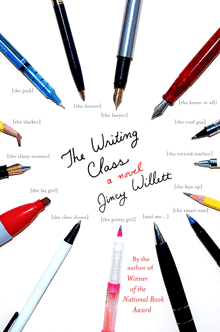The Writing Class by Jincy Willett

I have never attended a writing class, although I would LOVE to. Some of my friends have, in a similar circumstance to that described in this book: a community college with a disparate gathering of people.
Jincy Willett herself runs writing courses, even an online version, and has obviously used some of her experiences to draw together the characters and circumstances of this book.
I enjoyed reading, partly because I learnt material to help my writing and reviewing including the significance of creativity and the moral responsibility of the writer regarding their characters, technical details of grammar and tense, and the joy of words and their connections.
Willett quickly and effectively describes some absorbing characters: Doctor Surtees who is too busy to edit but desperate to get published, Edna Wentworth, a retired schoolteacher with a sharp eye for detail, Carla Karolak the serial attendee who writes broadly and poorly but with unquenchable enthusiasm.
Most endearing is the writing teacher, Amy Gallup, who describes herself as: "An aging, bitter, unpleasant woman living in Escondido, California who spends her days editing unreadable text and her nights teaching and not writing. Sometimes, late at night, in the dark, she laughs inappropriately."
Amy also blogs, and has lists, such as funny-looking words: "flocculent" and "kumquat". She also plays with the idea of novel hybrids, such as "Little Women who Run with Wolves: ...try valiantly but can't keep up, which is probably just as well" and "Suddenly Last Summa Theologica: The prolonged agony and hideous death of an effete young man at the hands of ravenous street urchins brilliantly sums up all that can be understood of Christian theology."
I have to admit that I really loved these little distractions from the main plot of the novel, which turned out to be a whodunit. I was a little disappointed when the story moved away from the character development, the content of the classes, and the amateurish attempts at writing; but Willett keeps the pages turning with a fine ability to intrigue and create suspense.
There is a foul aspect about some of the clues left by the murderer which I found disturbing to read. I have to admit though that this is not gratuitous writing, after all, murder is something that puts the person in place of god, an ultimate form of idolatry, and reflects profound darkness of soul; and what is being described are the functions of a deranged mind and soul.
In the end, in spite of my previously confessed lack of interest in the detective genre, I became obsessed with trying to pick the murderer, while desperately hoping Amy would survive.
I was correct (do you note a competitive streak?), and you will have to read the book for yourself to find out what happens to Amy.
However, there is a pleasing depth of transformation that occurs with at least two of the main characters: Amy and Carla, which is sometimes lacking in detective novels.
Perhaps that is because Willett, as a writing teacher herself, was under pressure to demonstrate the qualities and techniques of good writing.
This is a fun and interesting novel, which never takes itself too seriously, while reaffirming the importance of imagination and engagement and connection and story-telling.

























